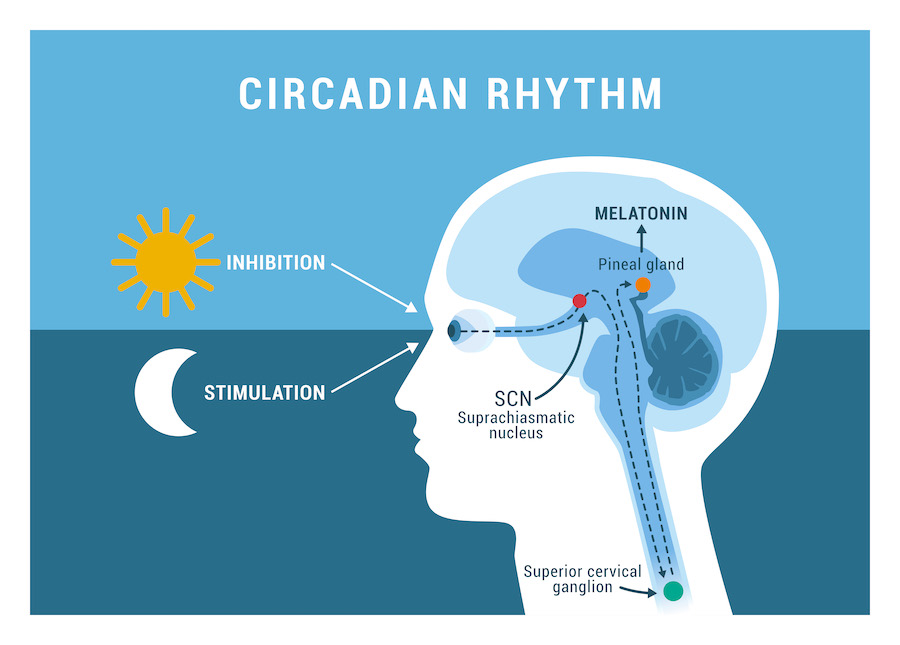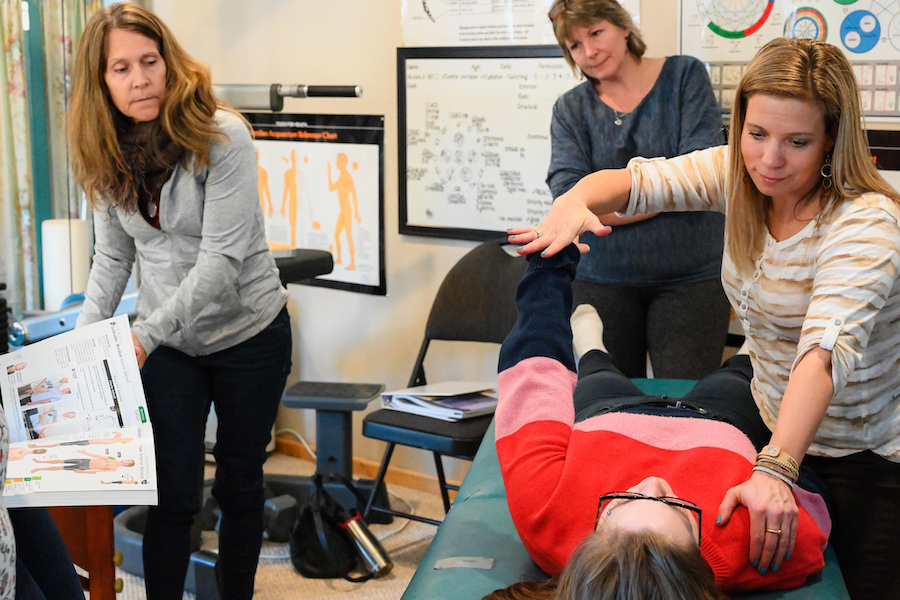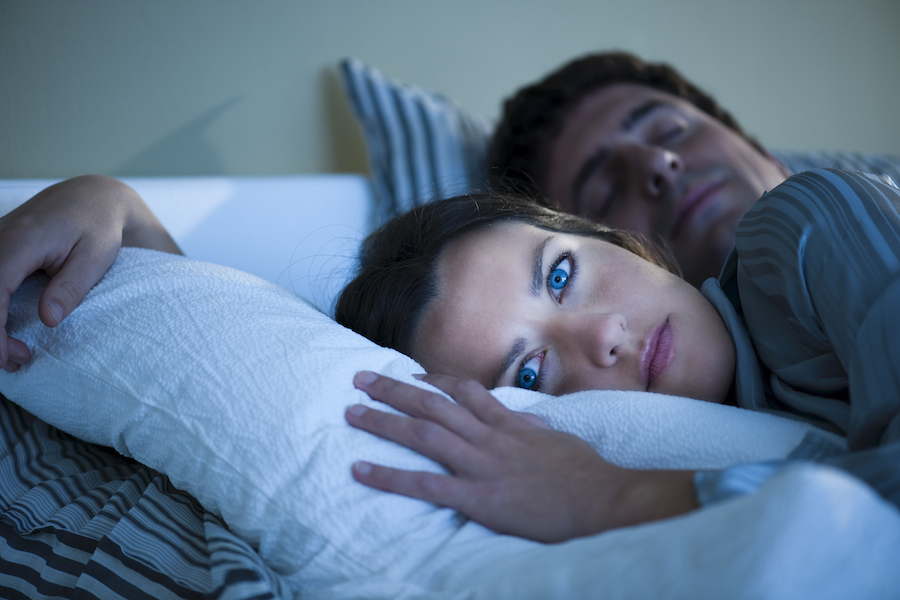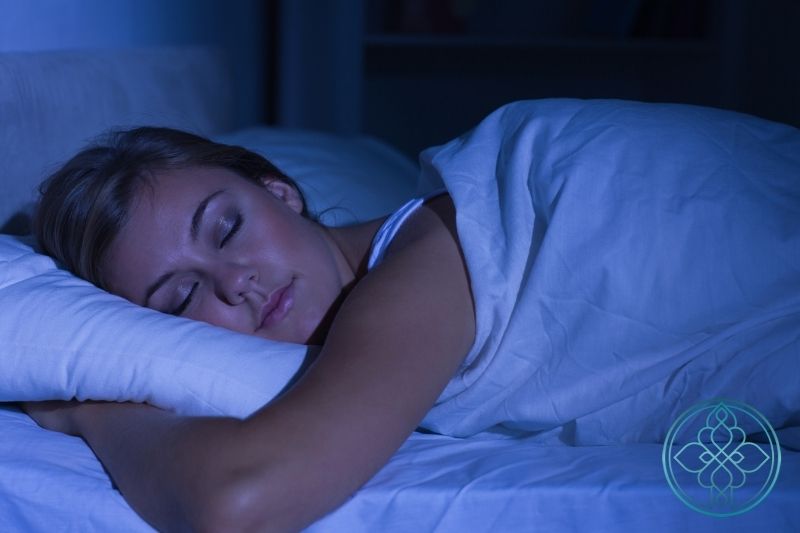One issue my clients often complain about is having difficulty getting a good night’s sleep.
This is always concerning to me because sleep is absolutely integral to our wellbeing, and lack of sleep can have a devastating impact on our health.
Luckily, there are a ton of simple strategies out there to help improve your sleep, and having a better understanding of the body can also help, as well.
So, in this article, I’m going to break down the role of the pineal gland when it comes to sleep, and provide several solid strategies for improving your sleep, so you can start getting more of it.
What is the Pineal Gland?
Also called the “third eye”, the pineal gland is a tiny little gland found right in the middle of the brain, where the two halves join together.
The pineal gland was named for its pinecone-like shape and has been the subject of many myths and much speculation, but I won’t get into all that in this article.
It helps to regulate our day/night cycles of light and dark, otherwise known as circadian rhythm, and it does that by performing its main function, which is to make melatonin.
Strangely enough, melatonin only gets released in the dark.

That being said, considering how much time we spend on our phones, and how many of us fall asleep in front of screens, it’s easy to understand why sleep problems have become so common.
If you don’t spend enough time in the dark, the pineal gland will be prevented from performing its function, creating a lack of melatonin, which can really mess up your sleep, along with several other things.
Some of the symptoms associated with an imbalance of melatonin include:
- SADS
- Cramps
- Insomnia
- Depression
- Night sweats
- Difficulty waking up
- Decreased mental acuity
- Decreased muscle control
- Decreased immune response
- Difficulty coping with stress
How the Law of the Five Elements Relates to the Pineal Gland
The law of the five elements is something that’s covered in the Touch for Health classes I teach.
This concept goes back thousands of years and originates from the traditional Chinese paradigm.
If I had to give a detailed explanation of it in this article, you’d be here all day.
But in short, the law of the five elements is based on an ancient understanding of how energy flows in the body and how that flow is influenced by every aspect of life.
That being said, in the Touch for Health modality, we do what’s called muscle testing, which allows us to look at the unique relationship between muscles, glands, and organs, and how each muscle has an organ/gland system with which it’s intimately connected.

The unique thing about muscle testing is it allows us to assess the body, organ systems and acupuncture system, enabling us to gather insight and discover how different things like foods, emotions, and physical components influence our overall wellness both directly and indirectly.
How does this relate to the pineal gland?
Well, when we take a look at how the law of the five elements relates to sleep, and more specifically, the pineal gland, we have to consider what’s known as a meridian system.
Meridian systems are paths that allow the flow of vital life energy, otherwise known as “chi”.
The governing meridian system, also known as Du Mai, is the system associated with the pineal gland. This system is related to the release of stored-up energy and can offer us insight into things that are burdensome.
The muscle associated with the governing meridian system is called the teres major, and it’s located in the back of the inside corner of the shoulder blade.
If this muscle is out of balance, it can result in slouched forward movement of the shoulders, which can make it look like you’re carrying a heavy weight or burden, both literally and metaphorically.
The common thread here has to do with imbalances, such as burdens, darkness, built-up energy, carrying a heavy weight, and the need to release stored energy.
The point I’m trying to make is that because of the intimate connection between the governing meridian system and the pineal gland, any one of these imbalances can affect your sleep, and have a negative influence on your body’s peak performance and function.
In any case, those sleepless nights may be a sign that you’re holding onto stored up energy or things that are burdensome and no longer serve you.
It’s definitely something to think about.
How to Get Better Sleep
As I said above, having trouble sleeping is all too common today, and these issues can be caused by problems with the pineal gland, among many other things.
For example, sometimes when you’re trying to go to sleep, your brain will start to overthink things and the next thing you know, you’re feeling the burden of life’s ups and downs sweeping over you, and this can really get in the way of a restful night’s sleep!

I’m sure many of you have experienced nights like this before, and believe me, I know just how frustrating it can be.
Fortunately, there are lots of things you can do to improve the quality of your sleep.
Here are several techniques I recommend for how to get better sleep:
- Create a bedtime routine that will help you to wind down. This could include soft light, relaxing music, a warm bath, or a cup of chamomile tea. You can also use some relaxing essential oils. Cedarwood can help to stimulate the pineal gland and putting some lavender on your pillow can have a truly calming effect.
- Dump those burdens on paper before you plan to sleep. Try doing some journaling as a method of release by writing down all the things weighing on your mind.
- Try some meditation and/or prayer. It can help to release all the worries and heavy feelings you have, which can have a huge impact on the quality of your sleep.
- Take some melatonin and remember to turn out the lights! The pineal gland can’t make melatonin when it’s exposed to light. So be sure your TV is off, limit screen time before bed, and don’t forget to turn off that bedside lamp!
- Be sure to take some time to enjoy the sunshine during the day, which can help your body create a more balanced circadian rhythm.
- Do your best to exercise a little each day so you can release some of that stored energy.
If you’re having trouble getting a good night’s sleep, and you want to try the supplements and essential oils mentioned above, I sell high-quality melatonin and essential oils, so if you’re interested in any of these products, or have any questions or concerns, please don’t hesitate to contact me directly.
